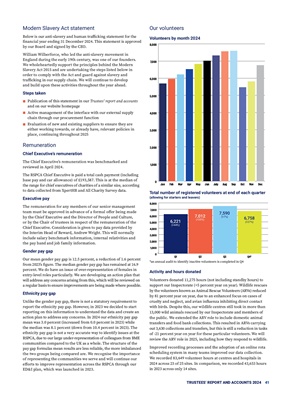
TRUSTEES' REPORT AND ACCOUNTS 2024 41
Modern Slavery Act statement
Below is our anti-slavery and human trafficking statement for the
financial year ending 31 December 2024. This statement is approved
by our Board and signed by the CEO.
William Wilberforce, who led the anti-slavery movement in
England during the early 19th century, was one of our founders.
We wholeheartedly support the principles behind the Modern
Slavery Act 2015 and are undertaking the steps listed below in
order to comply with the Act and guard against slavery and
trafficking in our supply chain. We will continue to develop
and build upon these activities throughout the year ahead.
Steps taken
• Publication of this statement in our Trustees' report and accounts
and on our website homepage
• Active management of the interface with our external supply
chain through our procurement function
• Evaluation of new and existing suppliers to ensure they are
either working towards, or already have, relevant policies in
place, continuing throughout 2025
Remuneration
Chief Executive's remuneration
The Chief Executive's remuneration was benchmarked and
reviewed in April 2024.
The RSPCA Chief Executive is paid a total cash payment (including
base pay and car allowance) of £193,587. This is at the median of
the range for chief executives of charities of a similar size, according
to data collected from XpertHR and All Charity Survey data.
Executive pay
The remuneration for any members of our senior management
team must be approved in advance of a formal offer being made
by the Chief Executive and the Director of People and Culture,
or by the Chair of trustees in respect of the remuneration of the
Chief Executive. Consideration is given to pay data provided by
the Interim Head of Reward, Andrew Wright. This will normally
include salary benchmark information, internal relativities and
the pay band and job family information.
Gender pay gap
Our mean gender pay gap is 12.5 percent, a reduction of 1.6 percent
from 2023's figure. The median gender pay gap has remained at 16.9
percent. We do have an issue of over-representation of females in
entry-level roles particularly. We are developing an action plan that
will address any concerns arising from this, which will be reviewed on
a regular basis to ensure improvements are being made where possible.
Ethnicity pay gap
Unlike the gender pay gap, there is not a statutory requirement to
report the ethnicity pay gap. However, in 2023 we decided to start
reporting on this information to understand the data and create an
action plan to address any concerns. In 2024 our ethnicity pay gap
mean was 3.0 percent (increased from 0.0 percent in 2023) while
the median was 8.1 percent (down from 10.4 percent in 2023). The
ethnicity pay gap is not a very accurate way to identify issues at the
RSPCA, due to our large under-representation of colleagues from BME
communities compared to the UK as a whole. The structure of the
pay gap formulas mean results are less reliable, the more imbalanced
the two groups being compared are. We recognise the importance
of representing the communities we serve and will continue our
efforts to improve representation across the RSPCA through our
ED&I plan, which was launched in 2023.
*an annual audit to identify inactive volunteers is completed in Q4
Activity and hours donated
Volunteers donated 11,275 hours (not including standby hours) to
support our Inspectorate (+5 percent year on year). Wildlife rescues
by the volunteers known as Animal Rescue Volunteers (ARVs) reduced
by 81 percent year on year, due to an enhanced focus on cases of
cruelty and neglect, and avian influenza inhibiting direct contact
with birds. Despite this, our wildlife centres still took in more than
13,000 wild animals rescued by our Inspectorate and members of
the public. We extended the ARV role to include domestic animal
transfers and food bank collections. This resulted in ARVs carrying
out 3,630 collections and transfers, but this is still a reduction in tasks
of -21 percent year on year for these particular volunteers. We will
review the ARV role in 2025, including how they respond to wildlife.
Improved recording processes and the adoption of an online rota
scheduling system in many teams improved our data collection.
We recorded 83,649 volunteer hours at centres and hospitals in
2024 across 23 of 25 sites. In comparison, we recorded 43,653 hours
in 2023 across only 14 sites.
0
1,000
2,000
3,000
4,000
5,000
6,000
7,000
8,000
DecNovOctSepAugJulyJunMayAprMarFebJan
Our volunteers
Volunteers by month 2024
0
1,000
2,000
3,000
4,000
5,000
6,000
7,000
8,000
Q1 Q2 Q3 Q4*
6,221
(+44%)
7,012
(+20%)
7,590
(+7%)
6,758
(+27%)
Total number of registered volunteers at end of each quarter
(allowing for starters and leavers)